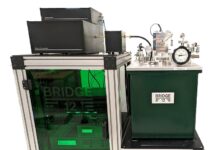
Developing radiation-hardenedsystems for space applications has a history of long lead times and high costs to achieve the highest level of reliability for multi-year missions in a harsh environment. Today, NewSpace and other critical aerospace applications require faster development and reduced costs. To meet these needs, a new microcontroller (MCU) that combinesspecifiedradiation performancewithlow-costdevelopment associated with Commercial Off-The-Shelf (COTS) devices is now available from Microchip Technology Inc.
The ATmegaS64M1 is the second 8-bit megaAVR MCU from Microchip that uses a development approach called COTS-to-radiation-tolerant.This approach takes a proven automotive-qualified device, the ATmega64M1 in this case, and creates pin-out compatible versions in both high-reliability plastic and space-grade ceramic packages.The devices are designed to meet radiation tolerances with the following targeted performances:
- Fully immune from Single-Event Latchup (SEL) up to 62MeV.cm²/mg
- No Single-Event Functional Interrupts (SEFI) which secure memory integrity
- Accumulated Total IonizingDose (TID) between 20 to 50Krad(Si)
- Single Event Upset (SEU) characterisation for all functional blocks
The new device joins the ATmegaS128, a radiation-tolerant MCUthat has already been designed into several critical space missions including a Mars exploration plus a megaconstellation of several hundredLow Earth Orbit (LEO) satellites.
The ATmega64M1 COTS device, along with its full development toolchain including development kits and code configurator,can be used to begin development of hardware, firmware and software. When the final system is ready forthe prototype phase orproduction, the COTS device can be replaced with a pin-out compatible, radiation-tolerant versionin a 32-lead ceramic package (QFP32) with the same functionality as the original device. This leads to significant cost savings whilealso reducing development time and risk.
“Our COTS-to-radiation-tolerant approach results in a no-compromise, space-grade component and not merely an up-screened or enhanced device that’s targeted to the aerospace industry,” said Patrick Sauvage, director of Microchip’s aerospace business unit. “Developing with a COTS device that can be swapped out for a fully-functional high-rel plastic or ceramic equivalent with the same pin-out reduces development time, costs and risk for our customers.”
The ATmegaS64M1 meets the high operating temperature range of -55° C to +125° C. It is the first COTS-to-radiation-tolerant MCU to combinea Controller Area Network (CAN) bus, Digital-to-Analog Converter (DAC) and motor control capabilities.These features make it ideal for a variety ofsubsystems like remote terminal controllers and data handling functionsforsatellites, constellations, launchers or critical avionic applications.For more information visit www.microchip.com/ATmegaS64M1.


















